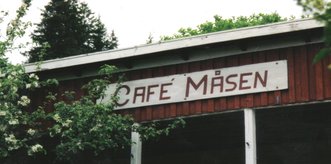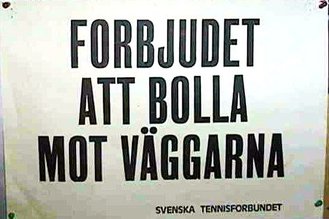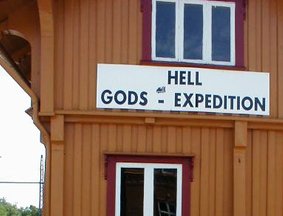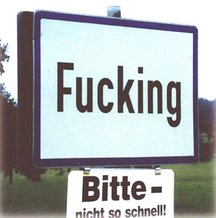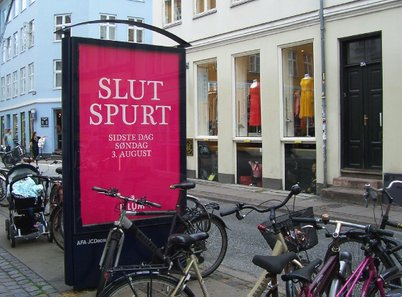WANDERLUST
LINGUISTIC QUIRKS
When living in a small country it seems like a necessity to learn foreign languages if you want to communicate with people outside your own country. From the first grade we were taught to understand Swedish and Norwegian. Not necessarily speak it, just understand it when you read it or listen to it. Later it is compulsory to learn English and at least one more foreign language, usually German. In later years this has changed a little. English is taughts from grade one and there is less emphasis on the other Scandinavian languages, unfortunately. The three Scandinavian languages are somewhat similar, but I think you both need to learn about the basic differences and also try to make an effort when listening in order to understand completely. This used to work fine, but many young people in Norway and Swedenimmediately started speaking in English to me when they heard I did not speak Norwegian to them. I am sure it’s the same in Denmark. I think this is sad, as it was quite a gift to be able to manage all over Scandinavia with one’s own language. Like a 'buy one get three' deal.
The hard part is not really the words that are completely different in the Scandinavian languages. The tricky words are those that seem alike but really have different meanings. A Swede asking for a 'rolig' [Swedish=fun] place in Copenhagen will sometimes be pointed in the direction of a 'rolig' [Danish=tranquil] place such as a cemetery by a well-meaning Dane. In a shop in Denmark a Swede will sometimes ask for a 'kasse' [Swedish=bag] and be given a 'kasse' [Danish=box] instead, which seems a bit of an overkill for the two apples and a chocolate bar they just bought. Some years back, when I was visiting a Swedish friend, we took a walk by the coast and found a nice little café called “Café Måsen” down by the water. 'Café Seagull'. Very idyllic. I do know what it means in Swedish, but somehow it was quite a distraction for me that the same name had a completely different meaning in Danish. Hardly a bad word, just a little childlike and funny: 'Café Botty'.
Some time ago another Swedish friend, whose knowledge of the Danish language (even below the waist) is excellent and knew I would appreciate the picture, e-mailed me this photo taken in a Swedish tennis hall. The text says it’s forbidden to [play] ball against the walls. However, in Danish the exact same words mean it’s forbidden to screw against the walls.
Then there is Norway…. When I was about ten and on holiday with my parents I made friends with a local Norwegian girl. On a nice summer day, we went swimming in a mountain lake. Wenche had already waded out into the water and as I was ready to get in, I shouted 'How is the water, Wenche?' and she answered that it was 'fresh'. I ran to the end of the jetty, jumped into the water and learned the hard way that there must have been nuances in the meaning of that particular word in our two languages, because she meant ‘ice-cold-so-your-blood-will-freeze’ and I heard ‘refreshing.’ I must have been close to getting a heart attack right then and there and ending my life as a ten-year-old! But now I’ll always remember that mountain lakes are cold, even on a hot summer day.
During a train travel in Norway I looked out of the window as the train stopped at a small town called Hell close to Trondheim. A lot of people rushed out of the train in order to get their picture taken with the sign at the cargo handling/godsexpedition. I stayed on the train. I mean, what does one do, if the train leaves and one gets stuck in Hell? And yes, it can get quite cold in the winter, so Hell does in fact sometimes freeze over!
There is that much publicized name of a small town in Upper Austria. No joke, no hoax, it is a real place. And actually not that far from Petting, Bavaria. The beginning of the word is pronounced like the beginning of ‘food’, but still. It seems tourists constantly go there to take pictures, and sometimes to take the sign itself. There is a ‘drive
carefully’ sign below the name of the town, but literally translated from German it means, 'Please, not so fast!' which does not make the whole thing less amusing, somehow. The local people are fed up with having to replace the sign constantly and even had a vote about a name change a few years ago but decided to keep their 1000-year old name. You’d think the local people might try to cash in on this tourist pilgrimage, but there are no souvenirs. They have no F***ing postcards and no F***ing T-shirts for sale!
My American friend Paul understands Danish quite well but brought to my attention that he found it very interesting, and slightly intimidating, when he saw a door with the sign BAD at the aquatic centre. (It means bath). Some time ago we were walking through the Latin Quarter in Copenhagen and he turned his head to have a second look at this sign and I had to smile! In Danish 'slut' just means finish. And the poster refers to the end of a sale. But it got his attention.
© emenel 2020
